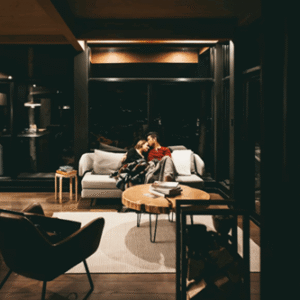It started as one of those weeks that leave you hollow. A long work project finally wrapped up—months of effort condensed into a ten-minute presentation that ended with a polite round of applause before colleagues hurried back to their inboxes. My instinct was to retreat into the familiar comfort of takeout on the couch. Thai again, maybe. Easy, quiet, forgettable.
But then another thought pushed through: What if I dressed up and took myself out instead?
So I did. I chose earrings usually reserved for weddings, spritzed perfume like it was armor, and walked downtown to a restaurant I’d been eyeing for months.
A Table for One
The restaurant glowed like a greenhouse at night—tall windows, hanging plants, candlelight bouncing off white tablecloths. The air carried the hum of people leaning in close, forks chiming against porcelain.
“Reservation for one,” I said firmly to the host, as though the statement itself didn’t need defense.
He smiled—no raised eyebrow, no pity—and led me to a table by the window. Outside, the city unfolded: headlights weaving patterns, a florist’s display glowing across the street, a couple walking their dog in steady rhythm. The table was angled just right. I could observe the world without feeling observed myself. My shoulders softened.
The server appeared with water and a basket of bread I’d read about in reviews. I ordered a glass of Albariño, a fennel and orange salad, and the halibut that countless diners had declared “life-changing.” The words were exaggerated, but curiosity won.
I slipped a book from my bag but didn’t open it. Instead, I listened. A couple debated whether to move to the suburbs. A woman at the bar laughed with the bartender who remembered her order. Behind a pass-through, chefs worked like choreographers, plates sliding out like polished gems.
Asked to Move
Just as I began to relax, the server returned, a hint of discomfort in his expression. “I’m so sorry,” he said carefully. “Would you be willing to move closer to the kitchen? We have a family arriving, and we’d like to combine your table with the one next to it.”
His request carried subtext: a single diner takes up less space, and space is valuable. The urge to apologize, to step aside with a cheerful “No problem!” surged up immediately. That instinct—to shrink, to yield—was well-practiced.
But something in me paused.
“Thank you for asking,” I said evenly. “I’d like to stay here.”
For a moment, conflict flickered in his eyes, then softened into relief. “Of course,” he said. “Absolutely. Thank you.” He walked away clutching the menu spine too tightly.
And then the shame crept in, uninvited. Who was I to refuse? Maybe the family needed extra room. Maybe I was selfish. But before that spiral swallowed me, the halibut arrived—perfectly seared, lemon and herbs layered like a quiet symphony. One bite steadied me again.
An Unexpected Thank-You
“Excuse me?”
I looked up, expecting the server. Instead, a woman in her forties stood at my table, navy wrap dress, lipstick carefully applied over visible exhaustion. Behind her hovered a family: twin girls in cardigans, a teenager with hair hiding his eyes, and a man adjusting his cuffs nervously.
“I’m the mother of the family that needed the extra table,” she said. I braced for criticism.
But her smile was warm. “I didn’t come to ask you to move. I came to thank you for not moving.”
I blinked, startled.
“It can be awkward,” she explained. “I’ve been where you are—dining alone, asked to make space as though you take up less. I wanted my kids to see that your being here matters. That a party of one is still a party.”
Her words softened something in me. She wasn’t scolding; she was affirming.
She added, “I used to eat alone a lot, after my divorce. People don’t realize how easily they push singles aside. I want my kids to understand we don’t ask others to shrink.”
Her kindness felt like a gift slipped across the table. “Thank you,” I managed.
“Enjoy your dinner,” she said, nodding toward my plate. “You chose well.” Then she returned to her family, the girls waving shyly as if we’d agreed on something unspoken.
Small Moments of Belonging
I ate slower after that, no longer in defiance but in gratitude. The fennel salad brightened my mood. The fish was seared just to the edge of char. Candlelight turned my glass of water into a lake.
Later, the twins sketched pictures with crayons. One held up a drawing: yellow circles for light, a window rectangle, and a stick figure—me—smiling at the table. “It’s you,” she said proudly. I placed a hand over my heart. “It’s perfect.”
The manager approached, cautious. “We appreciate your patience,” she said. I smiled, replying, “I didn’t move. But thank you for asking, not assuming.” She placed a lemon tart on the table—on the house. “For perspective.” We laughed together.
As I savored the dessert’s citrus brightness, an older man dining alone lifted his espresso in a silent toast. I nodded back. Two solitary diners recognizing each other across the room—a quiet solidarity.
A Lesson to Keep
When the family left, the mother stopped again. “Thank you,” she said. “I hope I didn’t overstep.”
“You didn’t,” I replied. “You gave me a sentence to keep: a party of one is still a party.”
Her smile said she understood. The children called “Goodnight!” and paraded out the door.
Even the host, when I left, seemed part of the lesson. “Reservation for one?” I had told him earlier. “My mom eats out alone a lot,” he confessed now. “I think about her.”
Carrying It Forward
Walking home, the city lights felt gentler. I thought about the family, the drawing, the lemon tart, the words I’d been gifted. Back in my apartment, I taped the crayon picture to my mirror, next to postcards and reminders. It turned the glass into a window, reflecting not just me but the truth I’d practiced that night: belonging doesn’t require company.
That evening, I went out simply to feed myself. I came home having learned something richer: that holding my place at the table is not selfish, but necessary. Eating alone did not make me lesser. It made me human, worthy of space, hungry for dinner, entitled to keep a seat by the window without apology.
The next morning, I brewed coffee, toasted bread, and let the sunlight spill across my table. I realized I would return to that restaurant—not to prove a point, but simply because the halibut was excellent, the tart was bright, and the table by the window had become, in its own way, a quiet affirmation: a small, steady yes.
Conclusion: Why Dining Alone Matters
Dining alone is not an act of loneliness—it’s an act of presence. It’s about claiming space, enjoying food without apology, and recognizing that one person at a table is just as worthy as four. My night out reminded me that solitude can be nourishing, dignity comes from small choices, and yes—a party of one is still a party.




